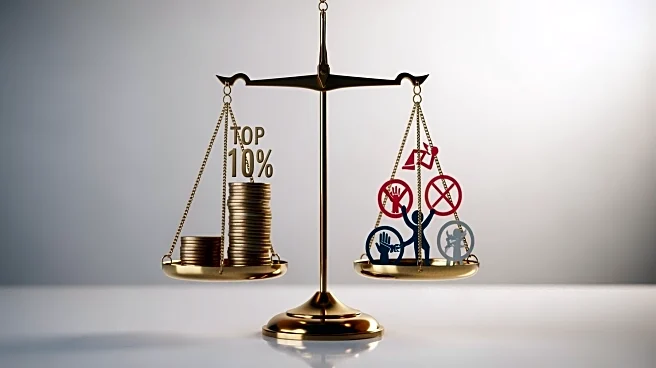What's Happening?
Ray Dalio, founder of Bridgewater Associates, has expressed concerns about the growing economic dependency of the United States on its top 1% of earners. Speaking at the Fortune Global Forum, Dalio highlighted
the significant disparities within the U.S. economy, noting that while states like California, Texas, and New York are driving GDP growth, 22 states are experiencing economic contraction. This uneven growth is contributing to a broader economic picture where the top earners are increasing their spending significantly, while the bottom 60% of the population faces economic challenges and lower productivity. Dalio's observations align with recent research from Moody's, which underscores the reliance on high-income earners to sustain economic momentum.
Why It's Important?
The insights provided by Ray Dalio underscore a critical issue in the U.S. economy: the increasing reliance on a small segment of the population to drive economic growth. This dependency poses risks, as any downturn in spending by the top earners could have significant repercussions for the broader economy. The disparity in economic growth across states and income levels highlights the challenges of addressing wealth inequality and ensuring sustainable economic development. Policymakers face difficult decisions regarding wealth redistribution and taxation, as these measures could impact productivity and economic stability. The situation calls for careful consideration of economic policies to balance growth and equity.
What's Next?
Moving forward, the U.S. may need to explore policy measures that address the growing economic divide. This could involve discussions on tax reforms, investment in education and skills development, and strategies to boost productivity among lower-income groups. The potential for economic instability if high-income earners reduce spending necessitates proactive measures to diversify economic growth sources. Stakeholders, including government officials and business leaders, will likely engage in debates on how to manage these economic disparities while fostering inclusive growth.
Beyond the Headlines
The current economic dynamics raise ethical and social questions about the sustainability of a system heavily reliant on a small percentage of the population. The long-term implications of such dependency could include increased social tensions and challenges in achieving equitable economic opportunities. Addressing these issues may require a shift in cultural and policy approaches to prioritize inclusivity and shared prosperity.









